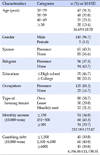1. American Psychiatric Association. Diagnostic and Statistical Manual of Mental Disorders. 5th ed. Arlington, VA: American Psychiatric Publishing Inc;2013. p. 991.
2. Ciccarelli M, Griffiths MD, Nigro G, Cosenza M. Decision making, cognitive distortions and emotional distress: a comparison between pathological gamblers and healthy controls. J Behav Ther Exp Psychiatry. 2017; 54:204–210. DOI:
10.1016/j.jbtep.2016.08.012.

3. Barrault S, Varescon I. Cognitive distortions, anxiety, and depression among regular and pathological gambling online porker players. Cyberpsychol Behav Soc Netw. 2013; 16(3):183–188. DOI:
10.1089/cyber.2012.0150.

4. Rømer Thomsen K, Callesen MB, Linnet J, Kringerlbach ML, Mølle A. Severity of gambling is associated with severity of depressive symptoms in pathological gamblers. Behav Pharmacol. 2009; 20(5-6):527–536. DOI:
10.1097/FBP.0B013E3283305E7A.

5. Oei TP, Lin J, Raylu N. The relationship between gambling cognitions psychological states and gambling: a cross-cultural study of Chinese and Caucasians in Australia. J Cross Cult Psychol. 2008; 39(2):147–161.
6. Lee HP. The effect of irrational gambling belief to the pathological gambling. Korean J Clin Psychol. 2003; 22(2):415–434.
7. Yang KH, Chang MS, Kwak HW, Koo BH. The effects of irrational gambling belief and reports of wins on gambling behavior. Korean J Health Psychol. 2012; 17(2):371–384.

8. Källmen H, Anderson P, Andren A. Are irrational beliefs and depressive mood more common among problem gamblers than non-gamblers? a survey study of Swedish problem gamblers and controls. J Gambl Stud. 2008; 24:441–450. DOI:
10.1007/s10899-008-9101-0.

9. Quigely L, Yakovenko I, Hodgins DC, Dobson KS, El-Guebaly N, Casey DM, et al. Comorbid problem gambling and major depression in a community sample. J Gambl Stud. 2015; 31(4):1135–1152. DOI:
10.1007/S10899-014-9488-8.

10. Wood RTA, Griffiths MD. A qualitative investigation of problem gambling as an escape-based coping strategy. Psychol Psychother. 2007; 80(1):107–125. DOI:
10.1348/147608306X107881.

11. Fortune EE, Goodie AS. Cognitive distortions as a component and treatment focus of pathological gambling: a review. Psychol Addict Behav. 2012; 26(2):298–310. DOI:
10.1037/a0026422.

12. Steenbergh TA, Meyers AW, May RK, Whlean JP. Development and validation of the gamblers' beliefs questionnaire. Psychol Addict Behav. 2002; 16(2):143–149. DOI:
10.1037/0893-164X.16.2.143.

13. Toeneatto T. Cognitive psychopathology of problem gambling. Subst Use Misuse. 1999; 34(11):1593–1604. DOI:
10.3109/10826089909039417.

14. Raylu N, Oei TP. The gambling related cognitions scale (GRCS): development, confirmatory factor validation and psychometric properties. Addiction. 2004; 99(6):757–769. DOI:
10.1111/j.1360-0443.2004.00753.x.

15. Kim KH. The stage of change of problem gamblers for gambling abstinence, motivation for change of gambling abstinence, gambling cognitive errors, and gambling refusal selfefficacy [dissertation]. Daegu: Daegu University;2013. 120.
16. Sharp L, Tarrier N. Towards a cognitive-behavioral theory of problem gambling behavior. Br J Psychiatry. 1993; 162(3):407–412. DOI:
10.1192/bjp.162.3.407.
17. Kim SW, Grant JE, Eckert ED, Faris PL, Hartman BK. Pathological gambling and mood disorders: clinical associations and treatment implications. J Affect Disord. 2006; 92(1):109–116.

18. Lister JJ, Milosevic A, Ledgerwood DM. Psychological characteristics of problem gamblers with and without mood disorder. Can J Psychiatry. 2015; 60(8):369–376.

19. Han YO, Kim HJ, Lee YS, Kim HW, Kim TW, Lee JG. Psychological characteristics of the gambler visiting gambling treatment center. Korean J Health Psychol. 2012; 17(2):353–369.

20. The National Gambling Control Commission of Korea. Survey on the gambling industry using state. [internet]. Seoul: The National Gambling Control Commission of Korea;2010. cited 2010 Sep 3. Available from:
http://www.ngcc.go.kr/data/pds.do.
21. Oei TPS, Lin J, Raylu N. Validation of the Chinese version of the Gambling Related Congnitions Scale (GRCS-C). J Int Gambl Stud. 2007; 7(1):101–111. DOI:
10.1007/s10899-006-9040-6.
22. Chon KK, Choi SC, Yang BC. Integrated adaptation of CES-D in Korea. Korean J Health Psychol. 2001; 6(1):59–76.
23. Jung IK, Kwak DI, Shin DK, Lee MS, Lee HS, Kim JY. A reliabilty and validity study of geriatric depression scale. J Korean Neuropsychiatr Assoc. 1997; 36(1):103–112.
24. Hong JA. Factors influencing recognition of motivation for change in pathological gamblers. J Korean Acad Psychiatr Ment Health Nurs. 2016; 25(3):227–236. DOI:
10.12934/jkpmhn.2016.25.3.227.

25. Ferris J, Wynne H. The Canadian Problem Gambling Index. Final Report. Canadian Centre on Substance Abuse. 2001. February.
26. Leonard CA, Williams RJ. The relationship between gambling fallacies and problem gambling. Psychol Addict Behav. 2016; 30(6):694–704.

27. Park CY, Kim YY, Yoo YH, Hur TK. Psychological and social factors in problem gambling. J Leis Studs. 2009; 7(2):113–136.
28. Lee CM. The relationship between irrational gambling belief, self-esteem and social gambling abstinence period of pathological gambler-with emphasis on participants of gamblers anonymous. Koran Acad Prac Human Welf. 2015; 14:93–106.
29. Petry NM, Ammerman Y, Bohl J, Doersch A, Gay H, Kadden R, et al. Cognitive-behavioral therapy for pathological gamblers. J Consult Clin Psychol. 2006; 74(3):555–567. DOI:
10.1037/0022-006X.74.3.555.

30. Yang S, Hong JA. Factors influencing family-function in families of pathological gamblers. J Korean Acad Psychiatr Ment Health Nurs. 2015; 24(3):196–206. DOI:
10.12934/jkpmhn.2015.24.3.196.







 PDF
PDF ePub
ePub Citation
Citation Print
Print





 XML Download
XML Download